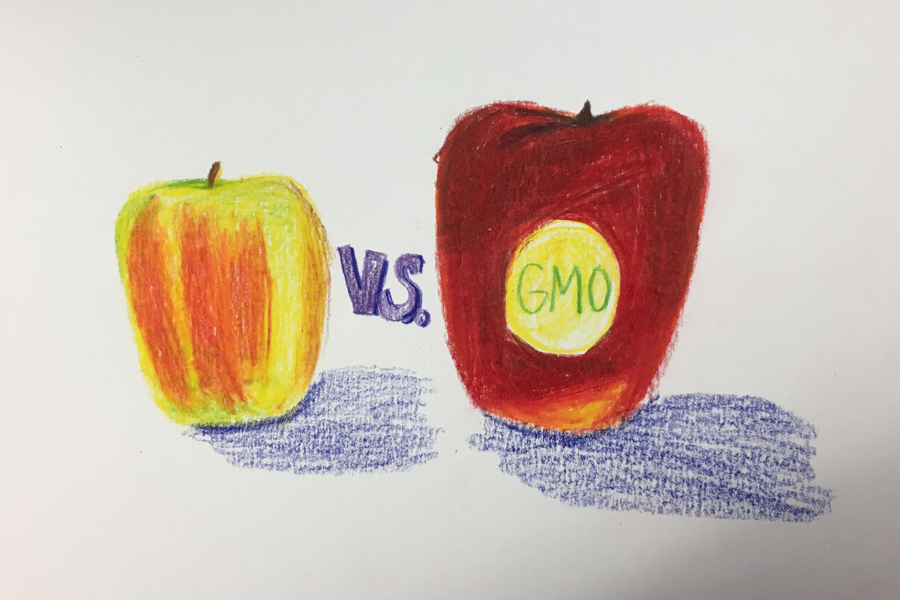Truth About The Food Industry Hidden In GMOs
illustration by Sydney Gastman
80 percent of all crops grown in the US, including corn, soy, sugar, cotton, and many more, contain genetically modified organisms (GMOs).
March 7, 2017
An apple that never browns, a pink pineapple, an antioxidant-enriched purple tomato–these are the types of genetically modified organisms (GMOs) that agrochemical businesses are planning to put on the market.
With an ongoing debate over whether or not GMOs are ethical, these companies strive to create products that will attract consumers. According to the Washington Post, under the brand Arctic Apple, agro-chemists are releasing a sliced apple product that comes in a plastic bag and never browns. It’s meant to be more convenient for consumers and to reduce the “yuck” factor that comes along with browning apples. So the question still remains: are GMOs ethical?
A GMO is a plant, animal, microorganism or other organism whose genetic makeup has been modified using recombinant DNA methods (also called gene splicing), gene modification or transgenic technology.
80 percent of all crops grown in the US, including corn, soy, sugar, cotton, and many more, contain GMOs. GM seeds were created to combat intense weather, pests, and other problems farmers may encounter. They are essentially pesticides, given all of the disease-preventing chemicals that are meshed into the crops. Since genetically modifying the seeds fights disease, many farmers use these GM seeds to produce the largest amount of crops possible. Therefore, there are fewer crops that go bad and must be thrown out. This practice helps strengthen food security in a world encompassed by hunger.
Counter to American farmers’ claims that they are helping to feed the world, eleven million pounds of food are thrown away in the US every hour. The US isn’t doing much to prevent food insecurity in that sense. To combat this issue, US citizens should aim their focus on reducing over consumption and producing nutritious foods. Americans should select which food to purchase based on quality rather than quantity. It will pay off in the long run with reduced costs for health issues, and it will show the food industry what consumers want: to reduce the production of GM crops.
According to Dr. Michael E. Rosenbaum who is a notable pioneer in the field of nutritional medicine- even in countries where millions go hungry, like Kenya and Haiti- GM crops are shunned. To make them, humans cross-breed genes in the crops, and although they have been cross-breeding crops for ages, they’re doing so with bacteria, which is a whole other breed of organisms. With that, GMOs are unnatural and alter the way that crops normally grow, raising suspicions in many traditional societies. South Africans protesters cry, “better dead than GMO fed.”
GMOs may be cheap, fast, and easy, but they are harmful to both the environment and the human body. The use of GMOs leads to more toxic chemicals in the food and soil, which remain in the environment long-term and can only be removed with additional toxic substances. GMOs also build up antibiotic resistance in humans, therefore making us more susceptible to disease. This leads to more health problems that could easily be avoided. Also, food with GMOs are generally less nutritious since they change the crop’s chemical structure and carry toxic chemicals.
GMOs are simply another way the very corrupt food industry is trying to manipulate the public to make the highest profit. America is one of the top countries for obesity, and heart disease is the leading cause of death. To save the health of our citizens and create a more productive society, all Americans need to be educated about the food they eat. Surely, no one would consume pesticides by choice. The government should make this information more public by basing its actions off of scientific facts, not based on which companies give it the most money.
Unfortunately, the Trump administration is looking to be very pro-GMO. Trump holds stock in Monsanto, the largest agrochemical corporation in America, and is also against GMO labeling. To show the government what consumers want, Americans need to advocate for GMO labeling and purchase non-GMO food.
Information for this story was gathered from nongrmoproject.org, AP Environmental Science textbook, and edgetraderplus.com.



